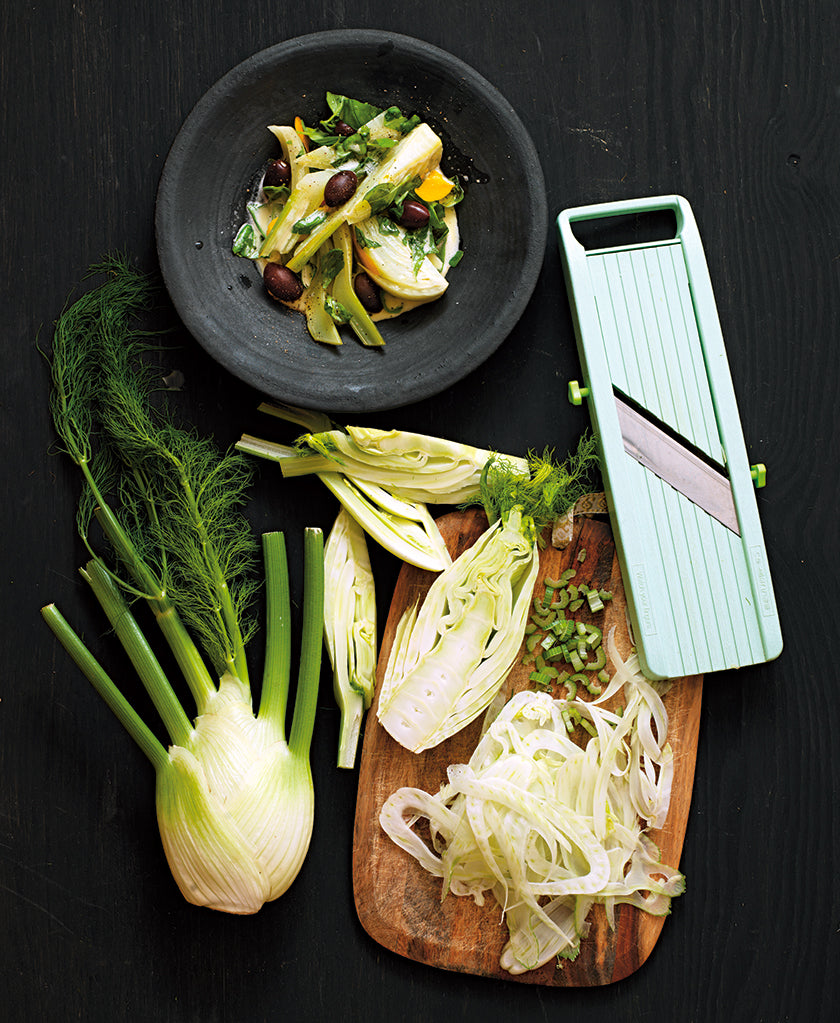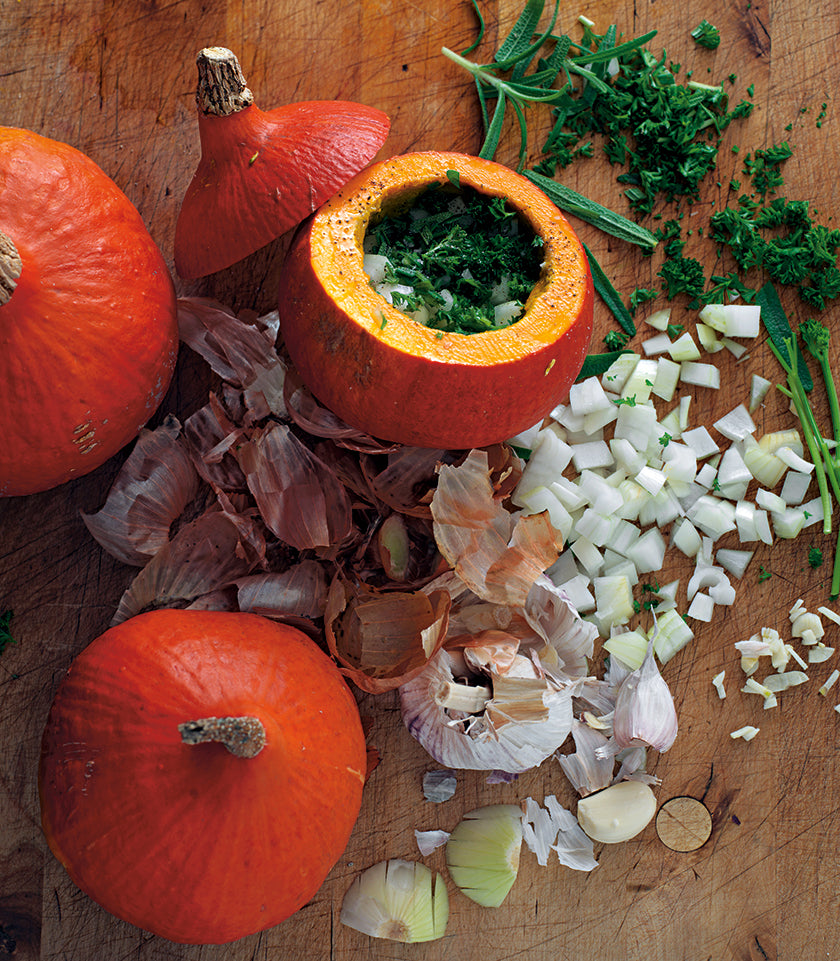
02/2020 food & beverages
“One cannot think well, love well, sleep well if one has not dined well,” Virginia Woolf once famously said about food. To dine well at home, there needs to be a desire to cook well and also a diverse wealth of dishes to serve. Going beyond ‘your signature plate’ helps keep the kitchen creative—sometimes you need a little more imagination when facing fennel in the fridge like an Old Western shootout.
Swedish chefs Anette Dieng and Ingela Persson have established a reputation around plant-based food and organic produce. Part of their vision was to create a recipe guide for some of our most commonly cooked vegetables in a bid to drastically stamp out food waste at home. Writers alongside being chefs, they created an organic vegetable and biodynamic produce box company Ekolådan as a project in 2002. Over time they evolved the concept to a non-profit foundation that pushed for clarity over its supply chain and offered cooking ideas for any lonesome plant-based ingredients left in the fridge.
Eat Your Greens! introduces more than 800 recipes for 40 different vegetables in a straightforward, painless way of cooking. Boiled, broiled, baked, pickled, raw, roasted, and fried, Dieng and Persson showcase a variety of cooking styles in simplistic ways to use all vegetables and fruits, no matter how small or large the quantity. A style for every appetite and occasion, explore recipes from three different ingredients that sometimes require a little more originality.

All parts of the fennel plant from the bulb, stalk, and the feathery fronds are edible. Native to the Mediterranean, they are often seen in pasta, salads, and slaws. (Photo: Erik Olsson)
Fennel is a member of the carrot family and is related to dill and parsley. Too hard to usually eat raw, fennel requires a longer cooking time than the bulb and fronds. Thinly sliced fennel can be sautéed. Larger slices can be blanched before being sautéed or baked. Overall fennel has diverse cooking options beyond a stew or pasta, here are three from chefs.
Raw with anchovies, orange, olive, and vinaigrette
In a bowl, combine thinly sliced fennel, chopped anchovies, orange segments, and olives. Whisk together 1 part red wine vinegar, 3 parts olive oil, and then add salt and pepper. Toss the salad with the vinaigrette and let stand for a few minutes to allow the flavors to mature.
Pickled with vinegar, sugar, water, and parsley
Thinly slice the fennel and put it into a preserving jar with a lid. Bring 1 part vinegar, 2 parts sugar, and 3 parts water to the boil. Let cool. Pour over the fennel and let it stand for a few hours. Remove the fennel from the jar and combine it with chopped parsley. Goes well with fried fish. Store in the fridge for up to two weeks.
Roast in a potato gratin with dill
Add a layer of thinly sliced fennel to the potato slices in a potato gratin. Sprinkle with plenty of chopped dill.

Pumpkins are often yellowish to orange in color, and they vary from oblate to globular to oblong; some feature a white rind. (Photo: Erik Olsson)
When thinking of a pumpkin, autumnal and wintry ideas sweep the ground. Thanks to their thick, hard skin, most pumpkins can be stored during colder months. In chunks, they can be cooked in water or stock until softened, in thin or diced slices they can be stir-fried, and of course, roasted for hours. Tuck into three recipes that parades the potential of pumpkin, from cake to savory appetizer.
Roast with garlic, chili, black beans, and baby leaf spinach
Peel and chop the pumpkin, then combine with oil, crushed garlic, sliced red chili, and salt before placing it on a baking tray. Bake at 400°F (200°C ) for about 20 minutes, or until soft and golden brown. Stir in cooked black beans and shredded baby leaf spinach.
Bake in a cake
Replace half the grated carrot in a carrot cake with grated pumpkin.
Fry with thyme, lemon, and garlic
Peel the pumpkin and cut it into small cubes, then fry in a skillet with olive oil until soft. Add thyme, grated lemon zest, and finely chopped garlic, and fry for a few more minutes. Season with salt and pepper.

A member of the cucumber and melon family, zucchinis are harvested while immature making the rind tender and edible. (Photo: Erik Olsson)
In Italian, ‘zucchini’ means small pumpkin. The small, delicately flavored green or yellow oblong summer squash isn’t suitable for storage and often needs to be eaten fairly quickly. A versatile vegetable that extends beyond getting dosed in garlic and butter. Because their flavor is quite neutral, zucchini can be combined with most other vegetables. Cut raw zucchini into thin slices or small cubes and serve in a salad with vinegar, thinly sliced onion, and herbs. Fry together with broccoli florets, onions, and garlic, then transfer to a saucepan, add the stock, and simmer to make a soup. We fix on three recipes from the book below.
Fry with flour, egg, polenta, and Parmesan
Cut zucchini into finger-thick slices. In a bowl, combine with a batter made from all-purpose flour, whisked eggs, and polenta. Fry in olive oil until golden brown. Drain on paper towels. Season with salt and pepper, and grate over Parmesan cheese.
Boil with leek and carrot
Thinly slice zucchini, leek, and carrot and add to pasta in a saucepan for the last few minutes of the cooking time.
Roast with tomato, herbs, and Parmesan
Cut zucchini and tomatoes into thin slices, then place in an ovenproof dish. Add olive oil, salt, pepper, and chopped fresh herbs, such as basil or marjoram, and grated Parmesan cheese. Bake at 440 °F (220 °C) for about 15 minutes, or until the cheese is golden.
Available in German and English from February 27 via our webshop, and April 28 in the USA.













